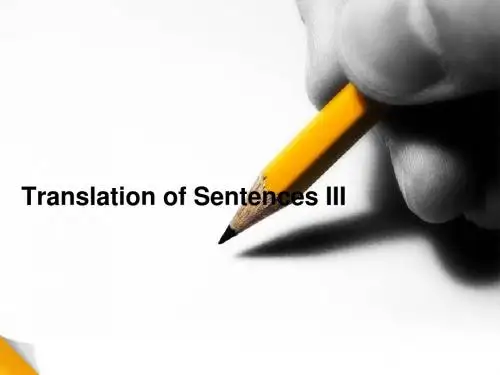汉英句子翻译 Translation of Sentence
- 格式:ppt
- 大小:320.50 KB
- 文档页数:10
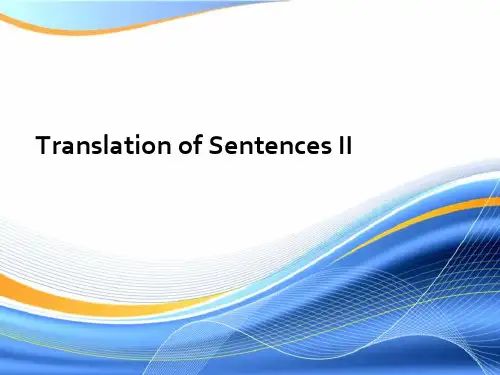
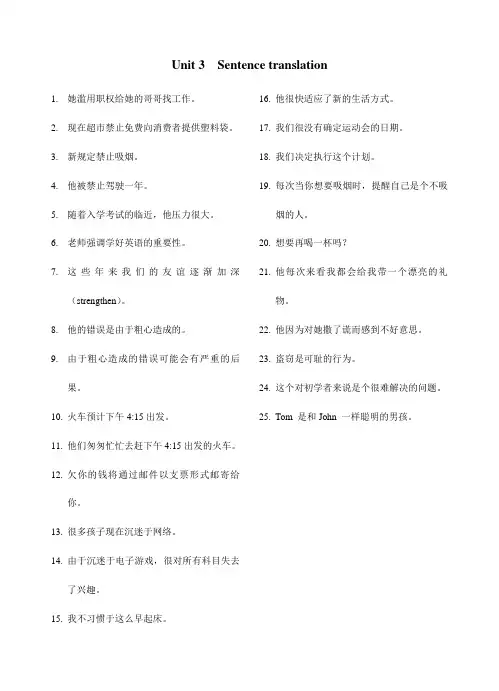
Unit 3 Sentence translation
1.她滥用职权给她的哥哥找工作。
2.现在超市禁止免费向消费者提供塑料袋。
3.新规定禁止吸烟。
4.他被禁止驾驶一年。
5.随着入学考试的临近,他压力很大。
6.老师强调学好英语的重要性。
7.这些年来我们的友谊逐渐加深
(strengthen)。
8.他的错误是由于粗心造成的。
9.由于粗心造成的错误可能会有严重的后
果。
10.火车预计下午4:15出发。
11.他们匆匆忙忙去赶下午4:15出发的火车。
12.欠你的钱将通过邮件以支票形式邮寄给
你。
13.很多孩子现在沉迷于网络。
14.由于沉迷于电子游戏,很对所有科目失去
了兴趣。
15.我不习惯于这么早起床。
16.他很快适应了新的生活方式。
17.我们很没有确定运动会的日期。
18.我们决定执行这个计划。
19.每次当你想要吸烟时,提醒自己是个不吸
烟的人。
20.想要再喝一杯吗?
21.他每次来看我都会给我带一个漂亮的礼
物。
22.他因为对她撒了谎而感到不好意思。
23.盗窃是可耻的行为。
24.这个对初学者来说是个很难解决的问题。
25.Tom 是和John 一样聪明的男孩。
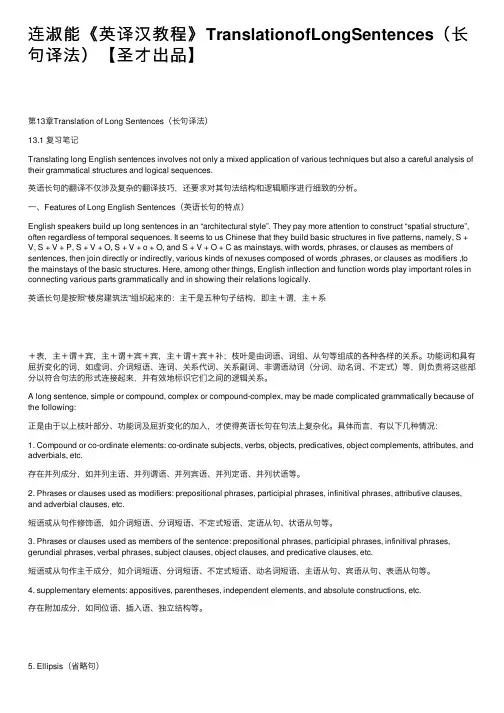
连淑能《英译汉教程》TranslationofLongSentences(长句译法)【圣才出品】第13章Translation of Long Sentences(长句译法)13.1 复习笔记Translating long English sentences involves not only a mixed application of various techniques but also a careful analysis of their grammatical structures and logical sequences.英语长句的翻译不仅涉及复杂的翻译技巧,还要求对其句法结构和逻辑顺序进⾏细致的分析。
⼀、Features of Long English Sentences(英语长句的特点)English speakers build up long sentences in an “architectural style”. They pay more attention to construct “spatial structure”, often regardless of temporal sequences. It seems to us Chinese that they build basic structures in five patterns, namely, S + V, S + V + P, S + V + O, S + V + o + O, and S + V + O + C as mainstays, with words, phrases, or clauses as members of sentences, then join directly or indirectly, various kinds of nexuses composed of words ,phrases, or clauses as modifiers ,to the mainstays of the basic structures. Here, among other things, English inflection and function words play important roles in connecting various parts grammatically and in showing their relations logically.英语长句是按照“楼房建筑法”组织起来的:主⼲是五种句⼦结构,即主+谓,主+系+表,主+谓+宾,主+谓+宾+宾,主+谓+宾+补;枝叶是由词语、词组、从句等组成的各种各样的关系。
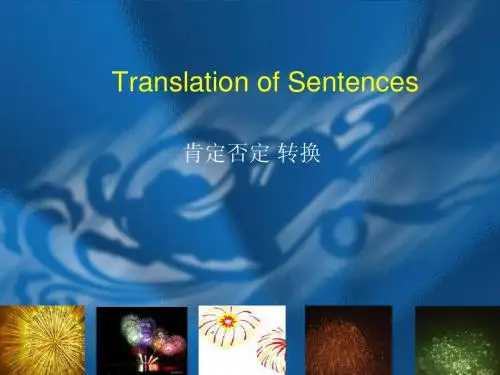
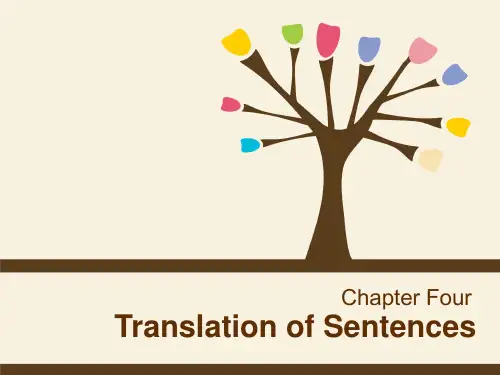
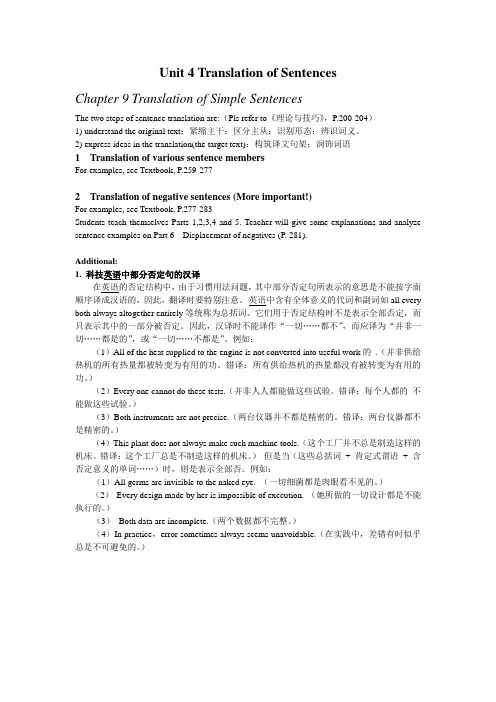
Unit 4 Translation of SentencesChapter 9 Translation of Simple SentencesThe two steps of sentence translation are:(Pls refer to《理论与技巧》,P.200-204)1) understand the original text:紧缩主干;区分主从;识别形态;辨识词义。
2) express ideas in the translation(the target text):构筑译文句架;润饰词语1 Translation of various sentence membersFor examples, see Textbook, P.259-2772 Translation of negative sentences (More important!)For examples, see Textbook, P.277-283Students teach themselves Parts 1,2,3,4 and 5. Teacher will give some explanations and analyze sentence examples on Part 6 Displacement of negatives (P. 281).Additional:1. 科技英语中部分否定句的汉译在英语的否定结构中,由于习惯用法问题,其中部分否定句所表示的意思是不能按字面顺序译成汉语的,因此,翻译时要特别注意。
英语中含有全体意义的代词和副词如all every both always altogether entirely等统称为总括词。
它们用于否定结构时不是表示全部否定,而只表示其中的一部分被否定。
因此,汉译时不能译作“一切……都不”,而应译为“并非一切……都是的”,或“一切……不都是”。
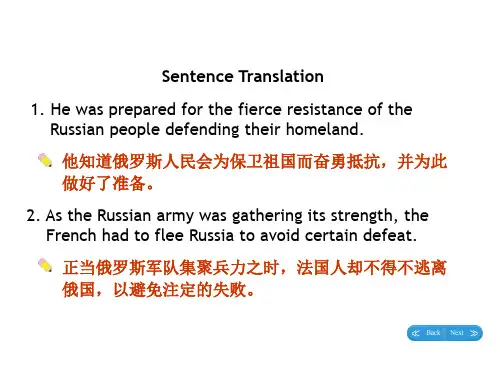
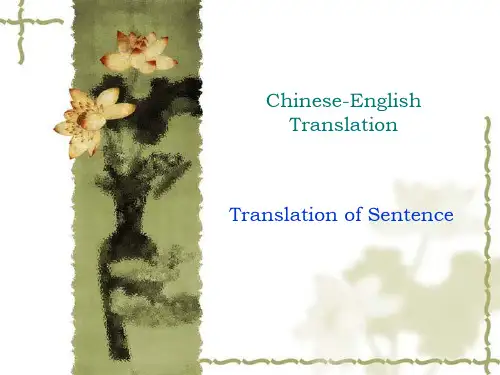
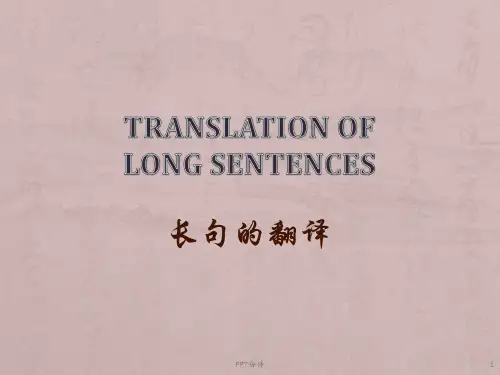
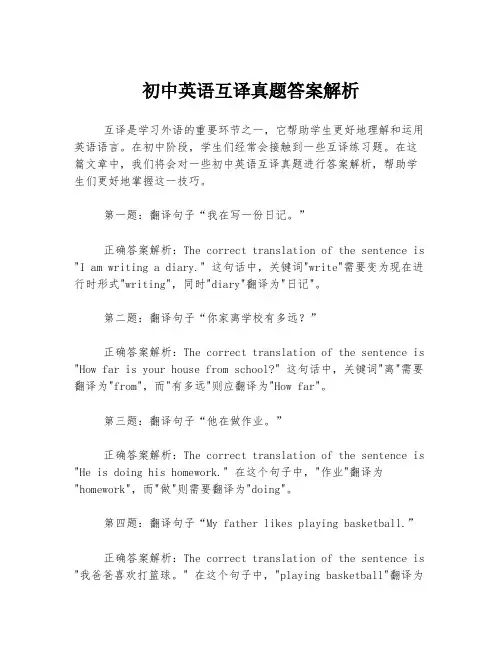
初中英语互译真题答案解析互译是学习外语的重要环节之一,它帮助学生更好地理解和运用英语语言。
在初中阶段,学生们经常会接触到一些互译练习题。
在这篇文章中,我们将会对一些初中英语互译真题进行答案解析,帮助学生们更好地掌握这一技巧。
第一题:翻译句子“我在写一份日记。
”正确答案解析:The correct translation of the sentence is "I am writing a diary." 这句话中,关键词"write"需要变为现在进行时形式"writing",同时"diary"翻译为"日记"。
第二题:翻译句子“你家离学校有多远?”正确答案解析:The correct translation of the sentence is "How far is your house from school?" 这句话中,关键词"离"需要翻译为"from",而"有多远"则应翻译为"How far"。
第三题:翻译句子“他在做作业。
”正确答案解析:The correct translation of the sentence is "He is doing his homework." 在这个句子中,"作业"翻译为"homework",而"做"则需要翻译为"doing"。
第四题:翻译句子“My father likes playing basketball.”正确答案解析:The correct translation of the sentence is "我爸爸喜欢打篮球。
" 在这个句子中,"playing basketball"翻译为"打篮球",而"likes"需要改为"喜欢"来符合中文的表达习惯。
